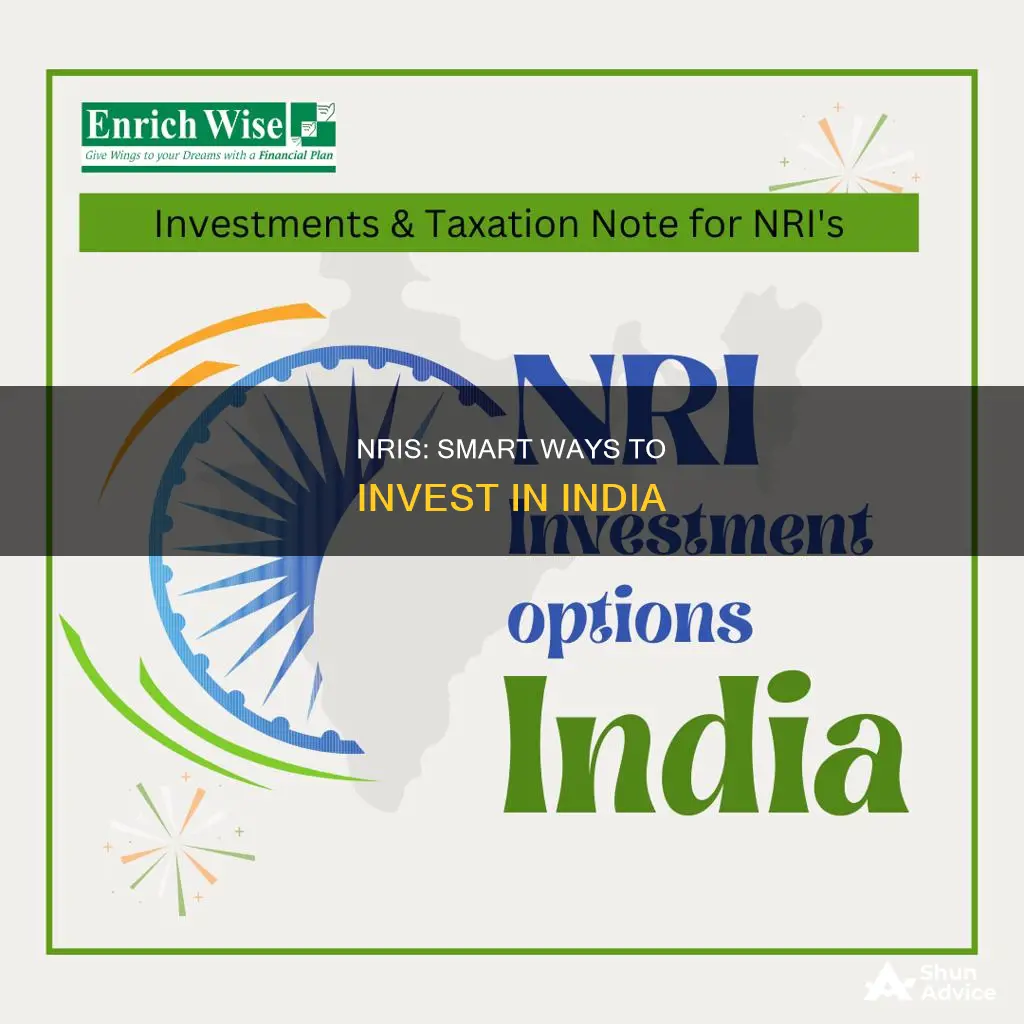
Non-resident Indians (NRIs) have a variety of investment options in India, including fixed deposits, mutual funds, direct equity, real estate, bonds, and the National Pension Scheme (NPS). NRIs can also invest in the Indian stock market through a Portfolio Investment Scheme (PIS) account, which is connected to a Demat account. However, it is important for NRIs to be aware of the regulatory requirements and tax implications of their investments, as well as to seek professional advice to ensure their investments align with their financial goals and risk tolerance.
| Characteristics | Values |
|---|---|
| Definition of NRI | Non-Resident Indian: an Indian citizen who spends less than 183 days in India per year |
| Tax status | NRIs are not required to pay tax in India |
| Investment options | Fixed deposit bank accounts, mutual funds, direct equity, real estate, bonds, NCDs, government securities, National Pension Scheme (NPS) |
| Accounts | NRIs can open NRE, NRO, and FCNR accounts |
| PPF accounts | NRIs cannot open PPF accounts in India |
| Floating rate saving bonds | NRIs cannot invest in floating rate saving bonds |
| Mutual funds | NRIs can invest in mutual funds, but those based in the US and Canada have certain restrictions |
| National Pension Scheme | Any individual aged 18-60 can open an NPS account |
| Real estate | NRIs can invest in residential and commercial real estate, but not agricultural land, farms, or plantations |

Fixed Deposits
Non-Resident External (NRE) Account
The NRE Fixed Deposit is used for parking funds earned outside India. It offers an interest rate of up to 7.81% which is tax-free in India, and both the principal amount and interest can be repatriated completely. The money in this type of account is kept in Indian rupees, and it's easy to convert the money back into dollars. The interest rates on these accounts vary depending on the deposit size and the bank, typically ranging from 7% to 9% per year. The tenure and interest rate differ from a domestic fixed deposit.
Non-Resident Ordinary (NRO) Account
The NRO Fixed Deposit is used to maintain the income for an NRI that is generated in India, such as rent income, dividend income, pension funds, etc. The interest rate on these accounts can go up to 7.30%*, but the interest earned is taxable in India at 30% along with surcharge and cess. There is a current limit of $1 million that is allowed to be transferred from this account to a U.S. account per year.
Foreign Currency Non-Resident (Bank) [FCNR(B)] Account
The FCNR (B) Fixed Deposit is a term deposit account in USD, GBP, EUR, JPY, AUD, CAD, SGD, HKD, and other currencies. The tenure can be fixed for up to 12 months, 24 months, 36 months, 48 months, or 60 months. The interest rate on these accounts can go up to 3%*, and both the principal amount and interest are completely repatriable. The interest income is not taxable in India.
RFC Fixed Deposits
This type of NRI fixed deposit can be opened by NRIs who wish to move back to India soon. The interest earned in this FD is fully repatriable. The United States Dollar, Great Britain Pound, and the Euro are accepted.
To open an NRI fixed deposit account, individuals need to provide their passport, visa/work permit, PAN card copy, and self-attested copy of their passport and visa. The process can be done online or at a bank branch.
ERP Modules: Unlocking Investment Management Potential
You may want to see also

National Pension Scheme
The National Pension System (NPS) is a government-backed pension scheme that helps Indian citizens save for retirement. The NPS is a market-linked, voluntary contribution scheme that is simple, systematic, portable, and flexible, making it an efficient way to boost retirement income.
Any Indian citizen between the ages of 18 and 60 can join the NPS, which offers two types of accounts:
- Tier 1 Account: This is a non-withdrawable account meant for retirement savings. All payments and funds in this account are locked until retirement. If you retire before the age of 60, you may take 20% of the investment as cash, and the rest must be invested in an annuity. If you retire after 60, you can take 40% as cash, and the rest must be annuitised.
- Tier 2 Account: This is a voluntary savings account that the subscriber can withdraw from at any time. Tier 1 account holders are allowed to open Tier 2 accounts, which have no restrictions on deposits and withdrawals. Tier 2 accounts also offer flexibility in choosing the investment portfolio.
The NPS offers exclusive tax benefits, and contributions can be made from NRE and NRO accounts. For repatriation of amounts, contributions should be made from NRE accounts only.
Managers Investing in Negative NPV Projects: Strategic Risk-Taking
You may want to see also

Mutual Funds
Step 1: Set Up an Account
NRIs must have either a Non-Resident Ordinary (NRO) or a Non-Resident External (NRE) bank account with an Indian bank to invest in Indian mutual funds. This is because Asset Management Companies (AMCs) in India cannot accept foreign currency investments. All investments made by NRIs must be in Indian Rupees.
NRE Account:
- Ideal for NRIs looking to transfer their foreign earnings to India.
- Interest earned on funds deposited in an NRE account is tax-free in India.
NRO Account:
- Suitable for NRIs who want to manage their income generated in India, such as rental income, dividends, or proceeds from property sales.
- Offers the advantage of repatriation, subject to applicable taxes.
Step 2: Know Your Customer (KYC) Compliance
Before starting to invest in Indian mutual funds, NRIs must complete the KYC process. This involves submitting relevant documents, including a copy of their passport, PAN card, recent photograph, bank statement, and proof of address. Some fund houses may also require in-person verification, which can be done at the Indian Embassy in the NRI's country of residence.
Step 3: Choose Investment Method
NRIs can choose from two primary methods to invest in Indian mutual funds:
Direct Investment:
- NRIs can submit their application and required KYC documents directly to the mutual fund company.
- In-person verification may be required.
Power of Attorney (PoA):
- NRIs can appoint a trusted individual in India to make investment decisions on their behalf.
- This method requires the signatures of both the NRI and the PoA on all KYC documents.
Step 4: Regulatory Compliance
In addition to KYC compliance, NRIs must adhere to other regulatory requirements:
- FEMA Regulations: NRIs must declare their adherence to Indian regulations, particularly those outlined in the Foreign Exchange Management Act (FEMA).
- Foreign Inward Remittance Certificate (FIRC): For mutual fund investments, payments must be made via cheque or demand draft, along with an FIRC to verify the source of funds.
Step 5: Redemption Process
When it's time to redeem the mutual fund investment, NRIs can follow the redemption procedure mentioned by the fund houses. The proceeds, after tax deductions, will be credited to the NRE/NRO account. For non-repatriable investments, the proceeds will be credited only to an NRO account.
Step 6: Tax Considerations
NRIs should be aware of the tax implications of investing in Indian mutual funds. India has signed the Double Taxation Avoidance Treaty (DTAA) with many countries, which helps mitigate the risk of double taxation. Additionally, the Foreign Account Tax Compliance Act (FATCA) requires all Indian and NRI investors to file a FATCA self-declaration.
By following these steps, NRIs can successfully invest in Indian mutual funds, contributing to India's economic growth and diversifying their investment portfolios.
Attorneys: Managing Alternative Investments for Financial Success
You may want to see also

Real Estate
Non-resident Indians (NRIs) have always played a significant role in the Indian real estate market. The Indian real estate sector has remained a hot favourite of property investors from across the world. NRIs are drawn to the steady returns offered by the Indian real estate market, whether it’s to secure their future or to maintain a connection to their roots.
Rules and Regulations
According to the Foreign Exchange Management Act (FEMA), NRIs are allowed to purchase any immovable property in India except agricultural land, plantation property, or a farmhouse. This is under the general permission of the Government of India. However, citizens of Pakistan, Bangladesh, Sri Lanka, Afghanistan, China, Iran, Nepal, or Bhutan are not allowed to acquire or transfer immovable property in India without prior permission from the Reserve Bank of India.
NRIs do not require approval from the Reserve Bank of India to invest in real estate in India. The introduction of the Automatic Route has simplified the process and eased the paperwork for NRI investment.
Modes of Payment
All transactions must be made in Indian rupees through local banks. NRIs can route the transactions through NRE/NRO accounts for the complete inward money remittances. They can also submit post-dated cheques or choose the Electronic Clearing Service (ECS) from NRE, NRO, or FCNR accounts.
NRIs who don't have funds readily available can apply for a home loan. The Reserve Bank of India has granted permission to banks and housing finance institutions registered with the National Housing Bank to provide home loans to NRIs for purchasing residential property in India.
Taxes
NRIs are entitled to the same tax benefits as residents of India. In addition, they have to pay a withholding TDS at a rate of 1% if they decide to buy a property worth more than Rs 50 lakh. They will be exempted from wealth tax if the property is vacant and declared as 'self-occupied'. Else, they will have to rent it out for at least 300 days a year to avoid paying wealth tax.
If an NRI sells a property within three years of purchase, it is considered a short-term capital gain, and the earnings through the property are taxable. If it's sold after three years, the NRI has the option of reducing the long-term capital gains tax by investing in another property. Lastly, if the property purchased is meant for rental purposes, the NRI will have to pay local taxes on the income earned.
Tips for NRIs Investing in Indian Real Estate
- Evaluate criteria like locations with quality infrastructure, the goodwill and reputation of property developers, and the history of previous properties of a similar nature.
- Research property exhibitions like those conducted by organisations such as Griha Pravesh and the Confederation of Real Estate Developers Association of India (CREDAI).
- Eliminate the middlemen to ensure that the price of the property and commitment is pure and original.
- Conduct a mandatory background check of the builder by inspecting the social media accounts of the real estate company and other online forums.
- Look for first-hand experiences by connecting with existing customers online to get an exact idea of their satisfaction with their investment.
- Utilise the Power of Attorney (POA) if you cannot be physically present in India to buy the property.
Waste Management: A Smart Investment for a Greener Future
You may want to see also

Public Provident Fund
The Public Provident Fund (PPF) is a popular long-term savings scheme offered by the Government of India. It is a safe and tax-friendly investment option that provides guaranteed returns. While NRIs are not permitted to open new PPF accounts, they can continue to hold and contribute to existing PPF accounts opened when they were resident Indians. Here are the key details about PPF for NRIs:
Eligibility and Account Opening:
NRIs cannot open new PPF accounts. However, if they had a PPF account before obtaining NRI status, they can continue the account until maturity. The eligibility criteria specify that only Indian citizens can open PPF accounts, and each individual can only have one account in their name, with an additional account allowed on behalf of a minor.
Account Tenure and Maturity:
PPF accounts have a fixed tenure of 15 years. NRIs cannot extend the account beyond this maturity period. Upon maturity, NRIs are required to close the account and cannot make any fresh contributions. The funds can be withdrawn or left in the account to continue earning interest.
Interest Rate and Taxation:
The interest rate for NRIs is the same as for residents and is set by the government on a quarterly basis. In India, the interest earned on PPF is tax-exempt, providing a tax benefit to investors. However, NRIs should be aware of the tax implications in their country of residence, as the interest may be taxable there.
Investment Limits and Contributions:
The annual contribution limit for PPF accounts is INR 1.5 lakhs, which is the same for both residents and NRIs. NRIs can continue contributing to their existing PPF accounts until maturity but cannot make any new investments after the account matures.
Repatriation and Withdrawal:
While the principal and interest amounts are fully repatriable, additional documentation may be required to prove the change in residency status. Withdrawals are allowed after the account has been active for at least seven years, and NRIs can also avail of loans against their PPF accounts during the 3rd to 6th year.
Account Closure:
NRIs can close their PPF accounts prematurely after completing five financial years if they no longer wish to maintain the account due to their change in residency status. The procedure for closure involves submitting the necessary documents, including a PPF withdrawal form, ID proof, passbook, and a cancelled cheque from their NRO account.
In summary, while NRIs cannot open new PPF accounts, they can continue contributing to and benefit from existing PPF accounts opened when they were resident Indians. It is important for NRIs to stay updated on the regulations and consult financial advisors to maximise their PPF benefits while complying with Indian and international financial regulations.
Strategies to Promote Your New Investment Portfolio
You may want to see also
Frequently asked questions
NRIs have a variety of investment options in India, including real estate, stocks, bonds, mutual funds, and fixed deposits.
The tax treatment of NRI investments depends on the type of investment and the individual's residential status. NRIs are generally subject to a similar tax regime as resident Indians, but it's important to consult a tax professional for specific advice.
NRIs can transfer funds to India through bank transfers, wire transfers, and online payment platforms. It's important to ensure that the mode of remittance complies with regulations set by the Reserve Bank of India (RBI) and the Foreign Exchange Management Act (FEMA).
NRIs can choose from several types of bank accounts, including Non-Resident External (NRE) accounts, Non-Resident Ordinary (NRO) accounts, and Foreign Currency Non-Resident (FCNR) accounts. Each type has its own features and benefits, so it's essential to understand the differences before making a decision.
NRI investments in India are subject to various regulatory requirements, including compliance with FEMA, Know Your Customer (KYC) norms, and other relevant guidelines. Familiarizing yourself with these rules is crucial to ensure your investments are made in a compliant manner.







